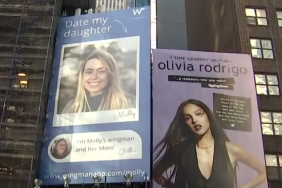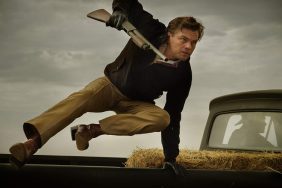Artwork: Boom Box Bruce (detail), 2012; Fab 5 Freddy (detail)
Back in the days, when the Broadway theaters along the Deuce had been reconfigured as movie houses, kung fu films reigned supreme. Born in Hong Kong as a backlash against the supernatural elements of traditional wuxia storytelling, Kung fu rejected the fantasy clichés and cheap effects in favor of the ancient stories of youxia, the knight-errants of a warrior’s quest.
Also: Art Is Not a Crime: The Most High-Profile Street Art Arrests in the USA
By the 1970s, kung fu films reached their greatest heights as Hong Kong flowered in the midst of a major economic boom. With the 1971 release of Bruce Lee’s first feature-length film, Big Boss, Kung fu broke out of the regional market and reached international audiences. Lee’s anti-imperialist stance, which was grounded in the principles of the Tao, spoke not only to his native communities but also to the African-American audiences in the United States.

Kung fu captured the imagination of a new generation of Americans coming up in the wake of the Civil Rights movement and the Vietnam War. A new narrative was born, one that fit the times as the ethos of Do It Yourself became words to live by. The struggles of the hero, classic plotting, the wicked fights, the cartoonish villains, and the wonky dubbing all made for a fantastic film-going experience.
At a time where one could post up in a movie theater all day and night, watching films one after another with only having to pay admission once—catching the latest kung fu flicks became a popular form of entertainment back when there were only 5 or 6 television channels and no Internet.
Invariably, the strength of kung fu culture left an indelible impression on the emerging Hip Hop generation. While pop culture classics like “Kung Fu Fighting” hit the airwaves, the underground would emerge in just a few years with the global takeover of the Wu-Tang Clan.
In celebration, Kung Fu Wildstyle reflects on this classic period of pop culture, and the way it spawned a cross-cultural, multi-generational dialogue between the East and the West through the works of Hip-Hop impresario Fab 5 Freddy and MC Yan, the Godfather of Chinese Hip-Hop.
Currently on view at the Smithsonian’s Arthur M. Sackler Gallery, Washington, D.C., through April 30, 2017, Kung Fu Wildstyle looks at the influence of Bruce Lee and kung fu on 1970s New York street culture and Hip Hop—which, in turn, came full circle in the 1990s, inspiring a new generation of Hong Kong street culture.
In speaking with Hypebeast, Fab 5 Freddy described the similarities between the different worlds: “It is the attitude. If you think of the early development of the American pop culture, especially movies, then you have the idea of the Western as a genre with the good guy/bad guy theme, with the Native Americans being unfairly labeled as the bad ones. After the Western, the gangster movie genre arrived, which was highly popular in America as well. Then, all of a sudden, you have this brand new thing carrying the same the good guy/bad guy gene but put in a completely new world featuring these Chinese guys with the cool kung fu gear and these great fighting skills set within this amazing culture. Every kid wanted to emulate every move. It was a phenomenal thing. Its energy made me realize how and why it resonated to our culture.”
The exhibition has included a series of events that present art works, film, music, and performance together, showcasing the consistent intersections between the cultures over the past 40 years. From Enter the Dragon (1973) to Wild Style (1983) visitors have been able to reconnect with the independent spirit that launched a brand new culture to the world. On Thursday, April 27, the Smithsonian will host The LA Uprising 25 Years Later at the Oprah Winfrey Theater at the National Museum of African American History and Culture.
Miss Rosen is a journalist covering art, photography, culture, and books. Her byline has appeared in L’Uomo Vogue, Vogue Online, Whitewall, The Undefeated, Dazed Digital, Jocks and Nerds, and L’Oeil de la Photographie. Follow her on Twitter @Miss_Rosen.
Kung Fu Wildstyle
-
"Kung Fu Wildstyle" exhibit at Arthur M. Sackler Gallery

Dan McCoy, 1936-, Photographer. 42nd Street, just west of Seventh Avenue, New York, 1970. Courtesy of Wikimedia Commons.
-
"Kung Fu Wildstyle" exhibit at Arthur M. Sackler Gallery

Big Boss movie poster.
-
"Kung Fu Wildstyle" exhibit at Arthur M. Sackler Gallery

Bruce Sextet, One Red, 2012, by Fab 5 Freddy.
-
"Kung Fu Wildstyle" exhibit at Arthur M. Sackler Gallery

Wild Style movie poster.
-
"Kung Fu Wildstyle" exhibit at Arthur M. Sackler Gallery

Boom Box Bruce, 2012. By Fab 5 Freddy.
-
"Kung Fu Wildstyle" exhibit at Arthur M. Sackler Gallery

Enter the Dragon movie poster.








